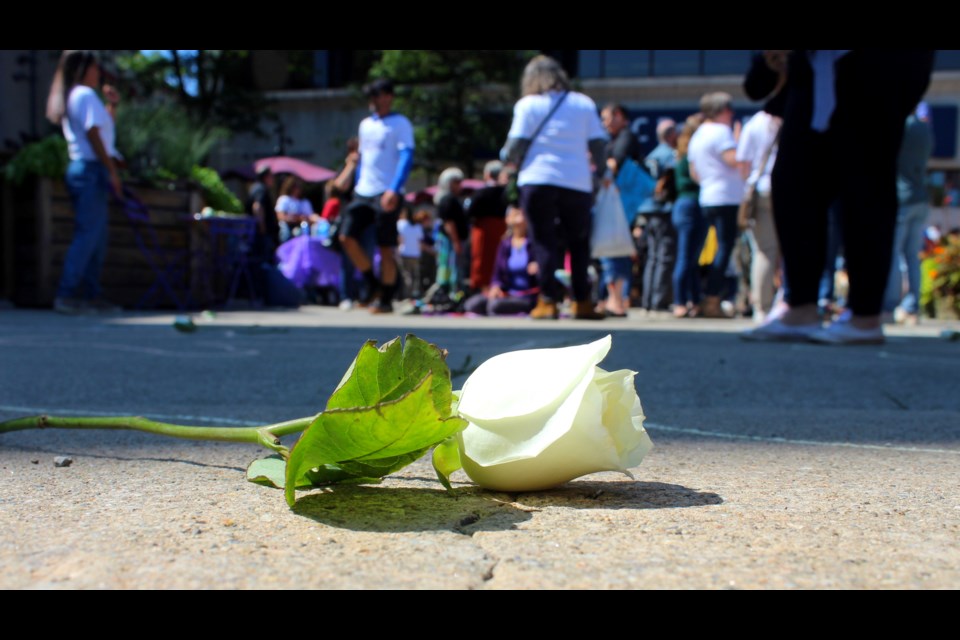It may be a new name, but on this International Drug Poisoning Awareness Day, the message is the same: every death is a policy failure.
Residents, many of whom have been impacted by the epidemic, took to Guelph's streets Thursday to remember those who have died, educate, and make calls for change.
The event is hosted by the Wellington Guelph Drug Strategy's peer advisory committee.
"We've been doing this for six years, and every year, it's getting a little bit bigger," said Tonya Evans, a peer navigator with CMHA Waterloo-Wellington and who helped facilitate the event.
"That's a bittersweet thing to say because I wish we didn't have to have this at all. But we do, and the community has been coming together and joining in on this day each year. That's heartwarming."
As of mid-August, at least 17 suspected opioid-related deaths have been recorded in Guelph this year.
Wellington-Dufferin-Guelph Public Health says in the first eight months of the year, there have been 31 suspected drug-related deaths in the region.
"Each of those deaths is a tragedy," Dr. Matthew Tenenbaum, the region's associate medical officer of health, said in a statement.
Over 35,000 people have died since 2016 because of drug poisoning across Canada.
The day used to be called International Overdose Awareness Day. But Evans said the new name really depicts what is going on.
"The term 'overdose' is like somebody is overusing something, and they're deliberately doing it, and they know what they're doing," she said.
"We have a toxic drug supply that's killing people. People that use don't know what they're using, they don't know the potency, they have no control over their use. Somebody could even try it for the first time and die because they have no idea what's in the drug. That's why people are dying."
The event started at Guelph City Hall. Residents marched to St. George's Square to share stories, memories and embraces.
Some in attendance later laid down on the concrete while others drew their outline in chalk – known as a die-in – and flowers were then placed within the outlines.
Some stories were emotional. From the mother who powered through tears to remember her daughter – who died four weeks ago – to the gathered crowd, to those sharing their past and present struggles.
People like Guelph resident Nicholas Menner.
"I do fentanyl, I've done meth, I've done every drug out there, but I am not a bad person," he told the crowd. "I will not steal from you, I will not lie to you, I will not screw you over in any way, yet I'm punished every single day just because I am a slave to a substance."
He said he didn't choose this road, and is tired of the stigma.
Fentanyl continues to be the drug most associated with drug poisonings.
In Guelph, the safe supply program has been a harm reduction tool used at the Guelph Community Health Centre, a program funded by Health Canada.
While over 100 clients have benefited, the WGDS says the program doesn't have enough funding to meet the level of need of the community.
Evans said drug policy change, and decriminalizing drugs is the next step forward.
"As long as people are being criminalized for using drugs, that cyclical system keeps people down," she said. "It's very hard for anybody to have a life if you have a criminal record because you used substances. Decriminalization would be massive, but drug policy change would be big."
For now, there are resources for those who want to seek help.
Deanis Smith used a number of substances for 15 years, but says he hasn't touched any of it since the beginning of 2021.
The 30-year-old Sarnia native has been with Stonehenge Theraputic Community in Guelph for the last four months, where he's been working on his treatment and going a lot of self-reflection.
"I'm just trying to figure out who I am, and what has led me down the road of disease of addiction," he said.
Smith said he got really sick and suffered withdrawals when he stopped.
He said he hit a point where he knew he needed to snap out of it.
"I'm only getting older, and I don't want to live with this addiction for the rest of my life," he said. "I believe I'm going to be successful, and that there's a purpose for me in life."
His message is to reach out and ask for help.
"There's support everywhere," Smith said. "Support in the community, support by family members and don't be afraid to reach out and ask for help. There's always a helping hand out there."
As for the community, Evans said we need to look at people using drugs as humans, and treat them with love, respect and kindness, no matter what.
"These are real human beings, and it can happen to anybody at any time," she said.
